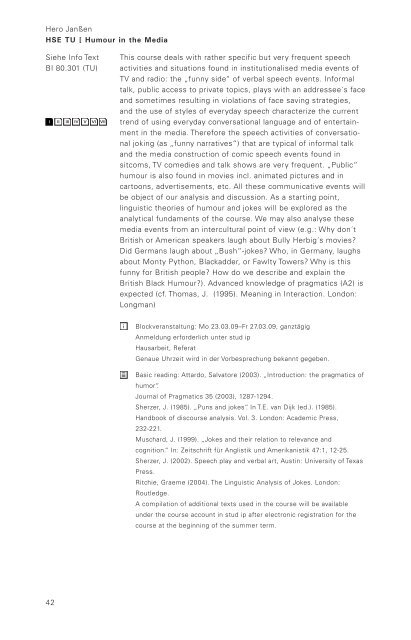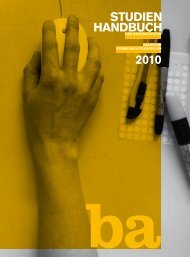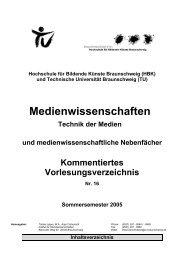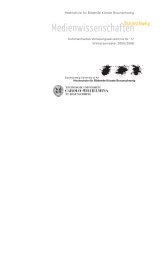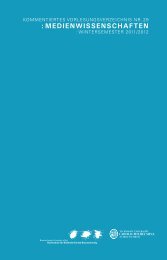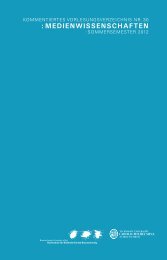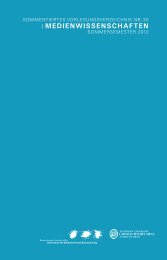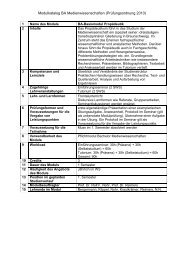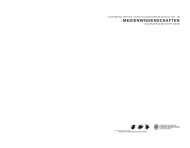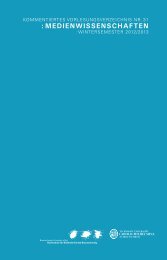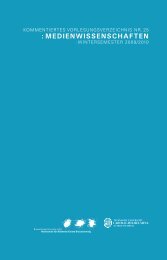Sommersemester 2009 - Medienwissenschaften
Sommersemester 2009 - Medienwissenschaften
Sommersemester 2009 - Medienwissenschaften
Erfolgreiche ePaper selbst erstellen
Machen Sie aus Ihren PDF Publikationen ein blätterbares Flipbook mit unserer einzigartigen Google optimierten e-Paper Software.
hero Janßen<br />
hse tU [ humour in the Media<br />
siehe info text<br />
Bi 80.301 (tu)<br />
42<br />
this course deals with rather specific but very frequent speech<br />
activities and situations found in institutionalised media events of<br />
tV and radio: the „funny side“ of verbal speech events. informal<br />
talk, public access to private topics, plays with an addressee´s face<br />
and sometimes resulting in violations of face saving strategies,<br />
and the use of styles of everyday speech characterize the current<br />
trend of using everyday conversational language and of entertainment<br />
in the media. therefore the speech activities of conversational<br />
joking (as „funny narratives“) that are typical of informal talk<br />
and the media construction of comic speech events found in<br />
sitcoms, tV comedies and talk shows are very frequent. „Public“<br />
humour is also found in movies incl. animated pictures and in<br />
cartoons, advertisements, etc. All these communicative events will<br />
be object of our analysis and discussion. As a starting point,<br />
linguistic theories of humour and jokes will be explored as the<br />
analytical fundaments of the course. We may also analyse these<br />
media events from an intercultural point of view (e.g.: Why don´t<br />
British or American speakers laugh about Bully herbig´s movies?<br />
Did germans laugh about „Bush“-jokes? Who, in germany, laughs<br />
about monty Python, Blackadder, or Fawlty towers? Why is this<br />
funny for British people? how do we describe and explain the<br />
British Black humour?). Advanced knowledge of pragmatics (A2) is<br />
expected (cf. thomas, J. (1995). meaning in interaction. london:<br />
longman)<br />
Blockveranstaltung: mo 23.03.09–Fr 27.03.09, ganztägig<br />
Anmeldung erforderlich unter stud ip<br />
hausarbeit, referat<br />
genaue uhrzeit wird in der Vorbesprechung bekannt gegeben.<br />
Basic reading: Attardo, salvatore (2003). „introduction: the pragmatics of<br />
humor“.<br />
Journal of Pragmatics 35 (2003), 1287-1294.<br />
sherzer, J. (1985). „Puns and jokes“. in t.e. van Dijk (ed.). (1985).<br />
handbook of discourse analysis. Vol. 3. london: Academic Press,<br />
232-221.<br />
muschard, J. (1999). „Jokes and their relation to relevance and<br />
cognition.“ in: zeitschrift für Anglistik und Amerikanistik 47:1, 12-25.<br />
sherzer, J. (2002). speech play and verbal art, Austin: university of texas<br />
Press.<br />
ritchie, graeme (2004). the linguistic Analysis of Jokes. london:<br />
routledge.<br />
A compilation of additional texts used in the course will be available<br />
under the course account in stud ip after electronic registration for the<br />
course at the beginning of the summer term.


